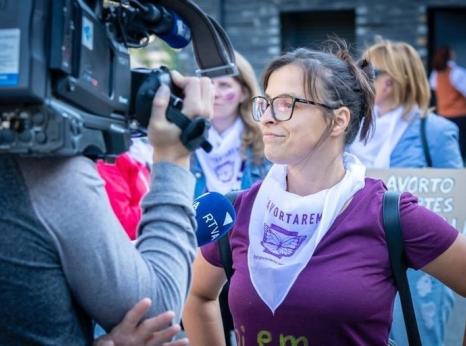Andorra: Activist Defending Abortion Rights Faces Trial

Vanessa Mendoza Cortés is a psychologist and the president of the women’s rights organization, Stop Violence, (Associació Stop Violències, in Catalan), which focuses on gender-based violence, sexual and reproductive rights, and advocates for safe and legal abortion in Andorra.
Andorra, with a population of around 77,000 people, has a total ban on abortion. Andorra and Malta are the only European countries that have such draconian abortion laws. As a result, people in need of abortions are compelled to travel abroad, mainly to France and Spain to seek the healthcare they are entitled to. Those unable to travel because of the cost or due to their uncertain legal status face a heightened risk of human rights violations. Stop Violence support pregnant women and girls to access abortions abroad and speak out to demand access to safe and legal abortion in Andorra. Vanessa Mendoza Cortés is a well-known activist in Andorra and is the main spokesperson for the organisation.
In October 2019, Vanessa Mendoza Cortés attended the Fourth Periodic Review Session of Andorra of the United Nations Committee on the Elimination of Discrimination against Women (UN CEDAW) where she spoke out about the harmful impact of the total abortion ban on women and girls in Andorra and other women’s rights concerns. Shortly after, the Andorran government lodged a complaint before the public prosecutor’s office arguing that Vanessa Mendoza Cortés’ statements were undermining the ‘’prestige and good name’’ of the government. In July 2020 the public prosecutor charged Vanessa Mendoza Cortés with ‘slander with publicity’ (article 172 of the Penal Code), ‘slander against the co-princes’ (article 320 of the Penal Code) and ‘crimes against the prestige of the institutions’ (article 325 of the Penal Code). These provisions carry heavy penalties, including a potential sentence of up to four years imprisonment and/or a fine of up to EUR 30,000 (circa USD 32,000). In 2021, the prosecutor dropped two of the charges involving prison sentences. In October 2022, a judge issued an indictment against Vanessa Mendoza Cortés for the alleged “crimes against the prestige of the institutions” involving a potential heavy fine and a criminal record if convicted.
The evidence presented by the public prosecutor’s office against Vanessa Mendoza Cortés also included in the indictment refers to the content of the shadow report submitted by Stop Violence to the UN CEDAW in 2019. It also includes media statements made by Vanessa Mendoza Cortés expressing critical opinions about the position against the decriminalization of abortion of the Bishop of Urgell and Co-Prince of Andorra, and voicing concerns about government actions affecting women’s rights. There is no date for the trial yet.
Amnesty International is concerned that the Andorran authorities are using defamation laws with the purpose or effect of inhibiting criticism of government or public officials, violating the right to freedom of expression guaranteed under Article 19 of the UN International Covenant on Civil and Political Rights (ICCPR) and Article 10 of the European Convention on Human Rights (ECHR). Current defamation laws in the Andorran penal code that are designed to protect state institutions should be repealed in line with international human rights standards that establish that legal provisions to protect the right to honour and reputation are designed to protect individuals, not abstract values, or state institutions. Defamation and libel should never be criminal offences. However, in December 2022, the Andorran parliament (Consell General, in Catalan) voted against the repeal of article 325 of the Penal Code (crimes against the prestige of the institutions), currently used against Vanessa Mendoza Cortés.
Moreover, according to UN Human Rights Council’s resolutions 12/2 (2009) and 24/24 (2013), acts of intimidation against those who seek to cooperate or have cooperated with the United Nations, its representatives, and mechanisms in the field of human rights, or who have provided testimony or information to them constitute acts of reprisals that should be halted and addressed. The prosecution of Vanessa Mendoza Cortes for exercising her right to freedom of expression and the concerted efforts to delegitimise her actions in defence of the human rights of women and girls, and in particular their sexual and reproductive rights, follow a global pattern of intimidation aimed at preventing women human rights defenders from challenging discrimination and promoting equality, particularly when their work defies traditional structures and patriarchal social norms.
In 2021, during the UN Universal Periodic Review, which assesses the human rights record of UN Member States, Andorra was asked to refrain from carrying out judicial harassment, reprisals and intimidation against human rights defenders, amend the defamation laws and decriminalise and make access to abortion safe and legal in the country.